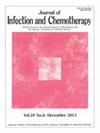A case of leptospirosis contracted through occupational exposure in the Tokyo metropolitan area
IF 1.5
4区 医学
Q3 INFECTIOUS DISEASES
引用次数: 0
Abstract
Leptospirosis is a zoonotic disease caused by direct or indirect contact with rodent reservoirs. Although it is widely known to be endemic in tropical countries, several cases have been reported even in metropolitan areas of non-tropical countries. Herein, we report a case of leptospirosis caused by occupational exposure in the Tokyo metropolitan area.
A 24-year-old man presented with fever, headache, and systemic arthralgia. Laboratory tests revealed thrombocytopenia, abnormal liver function, and impaired renal function. Although he denied any direct contact with rats, his workplace was contaminated with them, which was key to the diagnosis. Leptospira interrogans serogroup Icterohaemorrhagiae ST17 was identified as the causative agent based on multilocus sequence typing of the urine sample and the microscopic agglutination test of the paired serum samples. Subsequent epidemiological investigation revealed that L. interrogans serogroup Icterohaemorrhagiae ST17 was isolated from rats captured in the vicinity of the patient's workplace.
To the best of our knowledge, this is the first case of leptospirosis in Japan in which the same Leptospira genotype was identified in both the patients and the rats trapped around the patient's workplace. Although there is a widespread misconception that leptospirosis is a tropical disease, several cases are reported annually even in non-tropical industrialized cities, such as Tokyo, where rodents play a significant role in human infection. Diagnosis of leptospirosis is sometimes challenging for clinicians, but the first step in diagnosis is to recognize that there is always a risk of infection with Leptospira spp. in any environment potentially contaminated by rats.
东京都市圈因职业接触而感染钩端螺旋体病1例
钩端螺旋体病是一种由直接或间接接触鼠类宿主引起的人畜共患疾病。虽然人们普遍知道它在热带国家流行,但甚至在非热带国家的大都市地区也报告了几例病例。在此,我们报告一例由职业暴露引起的钩端螺旋体病在东京大都市区。24岁男性,表现为发热、头痛和全身关节痛。实验室检查显示血小板减少,肝功能异常,肾功能受损。尽管他否认与老鼠有任何直接接触,但他的工作场所被老鼠污染了,这是诊断的关键。根据尿样的多位点序列分型和配对血清的显微凝集试验,确定疑问钩端螺旋体血清组黄疸出血ST17为病原体。随后的流行病学调查显示,从在患者工作场所附近捕获的大鼠中分离出问诊乳杆菌血清组ictero出血热ST17。据我们所知,这是日本首例在患者和患者工作场所周围捕获的大鼠中发现相同钩端螺旋体基因型的钩端螺旋体病病例。尽管人们普遍误解钩端螺旋体病是一种热带疾病,但即使在东京等非热带工业化城市,每年也有几例病例报告,在这些城市,啮齿动物在人类感染中起着重要作用。钩端螺旋体病的诊断有时对临床医生具有挑战性,但诊断的第一步是认识到在任何可能被大鼠污染的环境中总是存在感染钩端螺旋体的风险。
本文章由计算机程序翻译,如有差异,请以英文原文为准。
求助全文
约1分钟内获得全文
求助全文
来源期刊

Journal of Infection and Chemotherapy
INFECTIOUS DISEASES-PHARMACOLOGY & PHARMACY
CiteScore
4.10
自引率
4.50%
发文量
303
审稿时长
47 days
期刊介绍:
The Journal of Infection and Chemotherapy (JIC) — official journal of the Japanese Society of Chemotherapy and The Japanese Association for Infectious Diseases — welcomes original papers, laboratory or clinical, as well as case reports, notes, committee reports, surveillance and guidelines from all parts of the world on all aspects of chemotherapy, covering the pathogenesis, diagnosis, treatment, and control of infection, including treatment with anticancer drugs. Experimental studies on animal models and pharmacokinetics, and reports on epidemiology and clinical trials are particularly welcome.
 求助内容:
求助内容: 应助结果提醒方式:
应助结果提醒方式:


